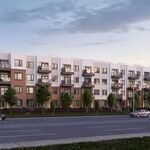Even though obviously there are many clustered ethnic enclaves in Toronto, the scale of the segregation is still not like the black-white segregation in some US cities like the South side of Chicago. For example, even though Torontonian kids may hang out with kids of the same race at recess, we still don't have many schools that serve a community where the locals are of only one race. Even the white and East or South Asian neighbourhoods in Toronto often don't have 90-95% of one race like they do in some African-American neighbourhoods stateside.
Also our segregation is less associated with poverty (in Toronto, it seems like more people cluster together by choice because of cultural ties -- many first-generation immigrants may live in enclaves but their kids integrate fine and won't necessarily still stay segregated). Unlike many American cities, our poorer neighbourhoods like Jane-Finch and the former Regent Park aren't and weren't dominated by any single race and include poor Asian, European, Caribbean, African, and Middle Eastern people etc. including recent immigrants, refugees etc. The US has more racial separation going back generations because of its history (where minorities may still have lived in the segregated areas their parents did or back when they were legally prevented from living places in the city), while I think Toronto's is more because of new immigration, not multi-generational segregation.
I've known someone who grew up in Scarborough who found the level of racial segregation shocking even in cities in California, which still are relatively not as segregated as East coast/Midwestern American cities.
http://www.bbc.com/news/world-us-canada-35255835




